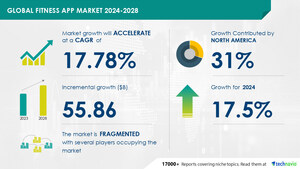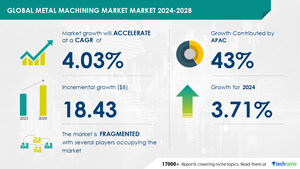NEW YORK, July 10, 2024 /PRNewswire/ -- The global enterprise labeling software market size is estimated to grow by USD 133.9 million from 2024-2028, at a CAGR of 6.59%, driven by the rise in adoption of enterprise labeling and demand for dynamic labeling. Artificial intelligence is influencing the market by enhancing labeling accuracy and efficiency, thus supporting growth. However, stringent government regulations for labeling procedures pose a challenge. Key market players include AstroNova Inc., Aulux Corp. Ltd., Cristallight Software, CYBRA Corp., Data Systems International, and others.
Get a detailed analysis on regions, market segments, customer landscape, and companies - Click for the snapshot of this report
Forecast period |
2024-2028 |
Base Year |
2023 |
Historic Data |
2018 - 2022 |
Segment Covered |
Deployment (On-premise and Cloud), End-user (FMCG, Retail and e-commerce, Healthcare, Warehousing and logistics, and Others), and Geography (APAC, North America, Europe, Middle East and Africa, and South America) |
Region Covered |
APAC, North America, Europe, Middle East and Africa, and South America |
Key companies profiled |
AstroNova Inc., Aulux Corp. Ltd., Cristallight Software, CYBRA Corp., Data Systems International, DDi, Esko Graphics BV, Freyr Software Services, Innovatum Inc., Kallik Ltd., Linn Systems Ltd., Loftware Inc., OPAL Associates Holding AG, PSI Systems Inc., RF SMART, Seagull Scientific Inc., TEC IT Datenverarbeitung, Teklynx Newco SAS, Tharo Systems Inc., and Wasp Barcode Technologies |
Key Market Trends Fueling Growth
Enterprise labeling software enables businesses to manage their labeling process dynamically by leveraging data from their databases. This approach introduces agility, allowing for manual changes and automatic updates to the database. Dynamic labeling streamlines label formatting and printing processes, managing regional, language, regulatory, and customer-specific information. Vendors focus on automated and integrated solutions to meet customers' requirements, reducing the need for manual labeling and inconsistencies. Dynamic labeling also facilitates color labeling, gaining popularity for regulatory compliance and product differentiation. The increasing demand for dynamic labeling fuels the adoption of enterprise labeling software.
Enterprise labeling software is a business solution that helps companies manage, create, and print labels for compliance with unique industry requirements. This software offers real-time updates, customizable templates, and integration capabilities to ensure product traceability and regulatory compliance. With the trend towards digitalization and automation, enterprise labeling software is becoming increasingly important for optimizing operations, enhancing product quality, and boosting customer satisfaction. Diverse industries such as retail, healthcare, and warehousing and logistics have distinct labeling needs, making adaptable and resilient solutions essential. Agile labeling solutions enable remote label design and collaboration, contactless processes, and safety measures. Compliance management, machine learning capabilities, and predictive analytics are driving factors in this market. Evolving challenges, such as logistics and supply chain complexities, are being addressed through cloud-based and on-premise solutions, as well as mobile applications and augmented reality features. Ultimately, enterprise labeling software is a key tool for businesses seeking to meet customer expectations, minimize errors, and stay competitive in today's fast-paced business landscape.
Discover 360° analysis of this market. For complete information, schedule your consultation- Book Here!
Market Challenges
- Enterprise labeling software is essential for businesses to ensure compliance with various government regulations and adapt to changing policies and procedures. End-users must attach accurate, quality, and efficient labels to their products, adhering to both regional and global regulations and standards. These labels should contain product information, regional languages, icons, and transactional data. Regulations such as the Globally Harmonized System (GHS) and British Standard (BS) 5609 must be followed. The GHS, implemented through Regulation (EC) No 1272/2008, helps identify hazardous chemicals. Vendors must provide GHS- and BS 5609-compliant software solutions, adding to their costs and potentially impacting profitability. Strict regulations on labeling procedures may limit the growth of the global enterprise labeling software market.
- The Enterprise Labeling Software Market is witnessing significant growth due to the increasing demand for efficient and accurate labeling solutions. Challenges such as speed, delivery time, and labeling quality are key drivers for businesses to adopt enterprise labeling software. However, manual changes, database management, and regulatory information consistency remain major concerns. Cloud-based labeling applications offer agility, flexibility, and scalability, addressing these challenges. However, operational costs, cyber-security, and maintenance are factors to consider. Leading players like BLUE Software, Loftware, Nicelabel, Prisym ID, and Innovatum provide solutions catering to various enterprise sizes and regulatory requirements. A data-driven approach and a user-friendly interface are essential for a competitive edge. Factors like language support, label formatting, and dynamic labeling are also crucial. The economic condition, urbanization, and packaging solutions' demand in various industries further fuel the market growth. Despite the benefits, on-premises based software still exists due to specific enterprise needs. Overall, the Enterprise Labeling Software Market is poised for innovation and growth.
For more insights on driver and challenges - Download a Sample Report
Segment Overview
This enterprise labeling software market report extensively covers market segmentation by
- Deployment
- 1.1 On-premise
- 1.2 Cloud
- End-user
- 2.1 FMCG
- 2.2 Retail and e-commerce
- 2.3 Healthcare
- 2.4 Warehousing and logistics
- 2.5 Others
- Geography
- 3.1 APAC
- 3.2 North America
- 3.3 Europe
- 3.4 Middle East and Africa
- 3.5 South America
1.1 On-premise- The on-premise segment holds a significant market share in the global enterprise labeling software market in 2023. On-premise solutions are installed and operated within an organization's premises, providing control over the software and its associated databases. These systems offer enhanced security as they are not hosted on remote servers or cloud platforms. On-premise enterprise labeling software caters to the specific needs of large businesses, automating their corporate-wide systems and functions. With the increasing emphasis on data security and control, the adoption of on-premise enterprise labeling software is on the rise, driving the market growth during the forecast period.
For more information on market segmentation with geographical analysis including forecast (2024-2028) and historic data (2018 - 2022) - Download a Sample Report
Research Analysis
Enterprise labeling software is a critical solution for businesses seeking to streamline their labeling process, ensuring compliance with industry regulations and maintaining labeling accuracy. This software facilitates the creation, management, and printing of labels in real-time, offering customizable templates and integration capabilities for seamless data management. The printing process is efficient and fast, reducing delivery time and increasing labeling quality. With innovative technology, enterprise labeling software provides a competitive edge by enabling real-time updates and user-friendly interfaces. Economic conditions, urbanization, and the growing demand for packaging solutions, branding, and enterprise segment applications continue to fuel the market's growth. On-premises based software offers additional benefits, such as improved security and control over labeling processes. Overall, enterprise labeling software is essential for businesses seeking to optimize their labeling operations, minimize errors, and maintain a strong market presence.
Market Research Overview
Enterprise labeling software is a critical solution for businesses seeking to ensure compliance, manage and create labels for various industries with unique labeling requirements. This software enables real-time updates, customizable templates, and seamless collaboration, optimizing operations and enhancing product traceability. Compliance management is a key feature, ensuring regulatory compliance and product quality, leading to increased customer satisfaction. Digitalization and automation are driving factors in the enterprise labeling market, with cloud-based solutions and mobile applications offering agility, flexibility, and scalability. However, evolving challenges such as cybersecurity concerns, data accuracy, and consistency require resilient and adaptable solutions. Industries like retail, healthcare, warehousing and logistics, and e-commerce have diverse labeling needs, necessitating agile labeling solutions. The surge in demand for standardized labeling and contactless processes is further fueling the market growth. Implementation costs, varying industry standards, and integration challenges are potential restraining factors. Legacy systems and cybersecurity concerns are also major challenges. Despite these challenges, the benefits of enterprise labeling software, including optimizing operations, enhancing product traceability, and providing a competitive edge, make it an essential tool for businesses. The market is witnessing the adoption of advanced technologies like machine learning capabilities, predictive analytics, and augmented reality features, offering improved efficiency, accuracy, and speed in the printing process. The future of enterprise labeling lies in digital transformation and the ability to adapt to changing business needs.
Table of Contents:
1 Executive Summary
2 Market Landscape
3 Market Sizing
4 Historic Market Size
5 Five Forces Analysis
6 Market Segmentation
- Deployment
- On-premise
- Cloud
- End-user
- FMCG
- Retail And E-commerce
- Healthcare
- Warehousing And Logistics
- Others
- Geography
- APAC
- North America
- Europe
- Middle East And Africa
- South America
7 Customer Landscape
8 Geographic Landscape
9 Drivers, Challenges, and Trends
10 Company Landscape
11 Company Analysis
12 Appendix
About Technavio
Technavio is a leading global technology research and advisory company. Their research and analysis focuses on emerging market trends and provides actionable insights to help businesses identify market opportunities and develop effective strategies to optimize their market positions.
With over 500 specialized analysts, Technavio's report library consists of more than 17,000 reports and counting, covering 800 technologies, spanning across 50 countries. Their client base consists of enterprises of all sizes, including more than 100 Fortune 500 companies. This growing client base relies on Technavio's comprehensive coverage, extensive research, and actionable market insights to identify opportunities in existing and potential markets and assess their competitive positions within changing market scenarios.
Contacts
Technavio Research
Jesse Maida
Media & Marketing Executive
US: +1 844 364 1100
UK: +44 203 893 3200
Email: [email protected]
Website: www.technavio.com/
SOURCE Technavio

WANT YOUR COMPANY'S NEWS FEATURED ON PRNEWSWIRE.COM?
Newsrooms &
Influencers
Digital Media
Outlets
Journalists
Opted In





Share this article